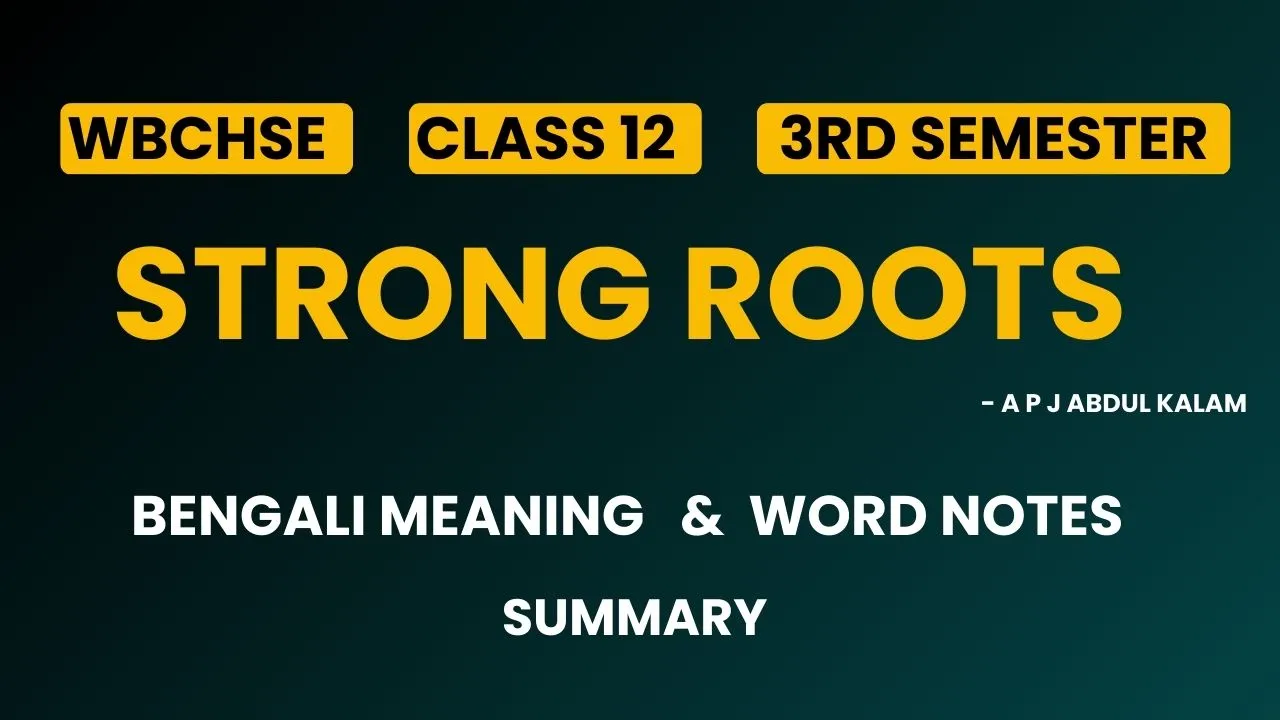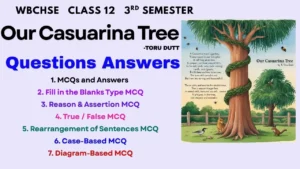Looking for Strong Roots Bengali Meaning and Summary? This article explains Dr. A.P.J. Abdul Kalam’s inspiring chapter Strong Roots from Wings of Fire. Learn how his early life, spiritual upbringing, and his father’s wisdom shaped his strong foundation. Ideal for WBCHSE Class 12 students, especially those in the 3rd Semester English syllabus. Strong Roots Bengali Meaning and Summary helps you understand the key points easily in Bengali.
Summary of The Text:
Dr. A.P.J. Abdul Kalam was born in a middle-class Tamil family in Rameswaram. His father, though not formally educated, was wise and generous. His mother was kind and often fed many people, including strangers. Kalam lived in a large ancestral house and had a peaceful, secure childhood.
His father had a close friend, Pakshi Lakshmana Sastry, the high priest of the Rameswaram temple. They often discussed spiritual matters. Kalam asked his father about the meaning of prayer. His father explained that prayer connects people spiritually and helps them rise above physical differences like wealth, caste, and age.
Kalam’s father had deep spiritual thoughts. He believed that every person has a role in the universe and that problems help people reflect on life. He said people should not fear difficulties because they help in self-understanding.
Kalam once asked why his father didn’t share his wisdom with others. His father replied that people often come to him in fear, looking for someone to solve their problems, but real answers lie within themselves.
Kalam remembered how disciplined and hardworking his father was. Even in old age, he followed a simple routine. Kalam always tried to follow his father’s path in his own field of science and technology.
This part of the autobiography shows Kalam’s humble beginnings. His father’s wisdom, kindness, and simplicity had a deep impact on him. It teaches us to stay grounded, be kind, and look inside ourselves for strength. The message is clear: spiritual strength and simplicity can guide us through life.
| Read: The Night Train at Deoli Bengali Meaning and Summary |
| Read: Strong Roots Bengali Meaning and Summary WBCHSE |
| Read: The Bet Bengali Meaning Word Notes and Summary WBCHSE |
বঙ্গানুবাদ: ড. এ.পি.জে. আব্দুল কালাম রামেশ্বরম শহরে একটি মধ্যবিত্ত তামিল পরিবারে জন্মগ্রহণ করেন। তাঁর বাবা আনুষ্ঠানিক শিক্ষায় বেশি না পড়লেও খুব জ্ঞানী ও উদার মনের মানুষ ছিলেন। তাঁর মা খুবই দয়ালু ছিলেন এবং প্রতিদিন অনেক মানুষকে খাওয়াতেন, এমনকি অপরিচিত মানুষকেও।
কালাম তাঁদের পুরনো পৈতৃক বাড়িতে শান্তিপূর্ণ ও নিরাপদ শৈশব কাটান। তাঁর বাবার ঘনিষ্ঠ বন্ধু ছিলেন রামেশ্বরম মন্দিরের প্রধান পুরোহিত পাক্ষী লক্ষ্মণ শাস্ত্রী। তাঁরা দু’জনে ধর্মীয় ও আত্মিক বিষয়ের উপর আলোচনা করতেন।
একদিন কালাম তাঁর বাবাকে জিজ্ঞাসা করেন—প্রার্থনার গুরুত্ব কী। তাঁর বাবা বলেন, প্রার্থনা মানুষকে আত্মিকভাবে যুক্ত করে এবং দেহ, ধন-সম্পদ, বর্ণ কিংবা ধর্মের ভেদাভেদ ভুলিয়ে দেয়।
কালামের বাবা বিশ্বাস করতেন, প্রতিটি মানুষই সৃষ্টির একটি বিশেষ অংশ এবং কষ্ট-দুঃখ আমাদের জীবনকে বুঝতে সাহায্য করে। তিনি বলেন, সমস্যার মধ্যেও নিজেদের ভেতরে উত্তর খুঁজে নিতে হয়।
কালাম একবার জিজ্ঞাসা করেন, তিনি এইসব কথা অন্যদের বলেন না কেন। তাঁর বাবা বলেন, মানুষ ভয় পেলে বাইরের কারো উপর ভরসা খোঁজে, কিন্তু আসল শক্তি নিজের ভেতরেই লুকিয়ে থাকে।
কালাম তাঁর বাবার কঠোর পরিশ্রম, নিয়মিত জীবনযাপন এবং আত্মবিশ্বাসী মনোভাব সবসময় অনুসরণ করার চেষ্টা করেছেন।
এই অংশে কালামের ছোটবেলার কথা জানা যায়। তাঁর বাবার সরল জীবন, বিশ্বাস আর জ্ঞান তাঁর ওপর গভীর প্রভাব ফেলেছিল। এটি আমাদের শেখায়—সরলতা, দয়া ও আত্মিক শক্তি থাকলে জীবন অনেক সুন্দর হয়।
Strong Roots Bengali Meaning Para 1
I was born into a middle-class Tamil family in the island town of Rameswaram in the erstwhile Madras state.
বঙ্গানুবাদ: আমি জন্মেছিলাম রামেশ্বরম নামক এক দ্বীপ শহরে, যা তখনকার মাদ্রাজ রাজ্যের অন্তর্গত ছিল, একটি মধ্যবিত্ত তামিল পরিবারে।
My father, Jainulabdeen, had neither much formal education nor much wealth; despite these disadvantages, he possessed great innate wisdom and a true generosity of spirit.
বঙ্গানুবাদ: আমার বাবা, জাইনুলআবেদিন, খুব বেশি প্রথাগত শিক্ষা বা ধন-সম্পত্তির অধিকারী ছিলেন না; কিন্তু এই সীমাবদ্ধতা সত্ত্বেও, তিনি সহজাত জ্ঞান এবং প্রকৃত উদার মানসিকতার একজন মানুষ ছিলেন।
He had an ideal helpmate in my mother, Ashiamma.
বঙ্গানুবাদ: আমার মা, আশিয়াম্মা, ছিলেন তাঁর এক আদর্শ সঙ্গিনী।
I do not recall the exact number of people she fed every day, but I am quite certain that far more outsiders ate with us than all the members of our own family put together.
আমি ঠিক মনে করতে পারিনা প্রতিদিন কতজন মানুষকে তিনি খাওয়াতেন, তবে আমি নিশ্চিত যে, আমাদের পরিবারের মোট সদস্যদের থেকেও অনেক বেশি বাইরের মানুষজন আমাদের সঙ্গে খেতেন।
Word-Meaning in Bengali Para 1:
Middle-class : Average : মধ্যবিত্ত
Erstwhile : Former : প্রাক্তন
Formal education : Academic learning : প্রাতিষ্ঠানিক শিক্ষা
Innate : Inborn : সহজাত
Generosity : Kindness : উদারতা
Helpmate : Companion : সঙ্গিনী
Outsiders : Strangers : বাইরের লোক
Strong Roots Bengali Meaning Para 2
My parents were widely regarded as an ideal couple.
বঙ্গানুবাদ: আমার বাবা-মাকে সবাই এক আদর্শ দম্পতি হিসেবে মনে করতেন।
My mother’s lineage was the more distinguished, one of her forebears having been bestowed the title of ’Bahadur’ by the British.
বঙ্গানুবাদ: আমার মায়ের বংশ ছিল অধিক খ্যাতিসম্পন্ন; তাঁর পূর্বপুরুষদের একজনকে ব্রিটিশরা ‘বাহাদুর’ উপাধিতে ভূষিত করেছিলেন।
Word-Meaning in Bengali Para 2:
Widely regarded : Well respected : সর্বজনস্বীকৃত
Lineage : Ancestry : বংশ
Distinguished : Eminent : খ্যাতনামা
Bestowed : Granted : প্রদান করা
Strong Roots Bengali Meaning Para 3
I was one of many children—a short boy with rather undistinguished looks, born to tall and handsome parents.
বঙ্গানুবাদ: আমরা অনেক ভাইবোন ছিলাম—আমি ছিলাম তাদের মধ্যে একজন, খাটো গড়নের, বিশেষ কোনো আকর্ষণহীন চেহারার একটি ছেলে, অথচ আমার বাবা-মা ছিলেন লম্বা ও আকর্ষণীয় চেহারার।
We lived in our ancestral house, which was built in the middle of the 19th century.
বঙ্গানুবাদ: আমরা আমাদের বংশপরম্পরায় পাওয়া বাড়িতে থাকতাম, যেটি উনিশ শতকের মাঝামাঝি সময়ে তৈরি হয়েছিল।
It was a fairly large pucca house, made of limestone and brick, on the Mosque Street in Rameswaram.
বঙ্গানুবাদ: সেটি ছিল একটি বড়সড় পাকাবাড়ি, চুনাপাথর ও ইট দিয়ে তৈরি, রামেশ্বরমের মসজিদ রোডে অবস্থিত।
My austere father used to avoid all inessential comforts and luxuries.
বঙ্গানুবাদ: আমার কঠোর জীবনযাপনকারী বাবা অপ্রয়োজনীয় বিলাসিতা ও আরাম-আয়েশ থেকে সবসময় দূরে থাকতেন।
However, all necessities were provided for, in terms of food, medicine or clothing.
বঙ্গানুবাদ: তবুও খাওয়াদাওয়া, ওষুধ কিংবা পোশাক—এই সব প্রয়োজনীয় বিষয়গুলোর কোনো ঘাটতি ছিল না।
In fact, I would say mine was a very secure childhood, materially and emotionally.
বঙ্গানুবাদ: আসলে আমি বলব, আমার শৈশব ছিল সম্পদ ও আবেগ—দুই দিক থেকেই খুব নিরাপদ ও নিশ্চিন্ত।
Word-Meaning in Bengali Para 3:
Undistinguished : Ordinary : সাধারণ
Ancestral : Inherited : পৈতৃক
Pucca house : Solid house : পাকাবাড়ি
Austere : Strict : অনাড়ম্বর
Inessential : Unnecessary : অপ্রয়োজনীয়
Luxuries : Comforts : বিলাসিতা
Necessities : Essentials : প্রয়োজনীয় জিনিস
Secure : Safe : নিরাপদ
Emotionally : Mentally : মানসিকভাবে
Strong Roots Bengali Meaning Para 4
I normally ate with my mother, sitting on the floor of the kitchen.
বঙ্গানুবাদ: আমি সাধারণত আমার মায়ের সঙ্গে রান্নাঘরের মেঝেতে বসে খেতাম।
She would place a banana leaf before me, on which she then ladled rice and aromatic sambar, a variety of sharp, home-made pickle and a dollop of fresh coconut chutney.
বঙ্গানুবাদ: তিনি আমার সামনে একটি কলাপাতা বিছিয়ে দিতেন, আর তার ওপরে ঢেলে দিতেন ভাত, সুগন্ধি সাম্বর, বিভিন্ন ধরনের ঝাল ঘরোয়া আচার আর এক চামচ টাটকা নারকেলের চাটনি।
Word-Meaning in Bengali Para 4:
Aromatic : Fragrant : সুগন্ধি
Variety : Type : বিভিন্নতা
Pickle : Preserved food : আচার
Dollop : Lump : এক চামচ/গাদা
Chutney : Sauce : চাটনি
Strong Roots Bengali Meaning Para 5
The Shiva temple, which made Rameswaram so famous to pilgrims, was about a ten-minute walk from our house.
বঙ্গানুবাদ: আমাদের বাড়ি থেকে শিব মন্দিরটি প্রায় দশ মিনিট হাঁটার পথ ছিল, যেটি রামেশ্বরমকে তীর্থযাত্রীদের কাছে বিখ্যাত করে তুলেছিল।
Our locality was predominantly Muslim, but there were quite a lot of Hindu families too, living amicably with their Muslim neighbours.
বঙ্গানুবাদ: আমাদের পাড়া ছিল মূলত মুসলিম প্রধান, তবে অনেক হিন্দু পরিবারও সেখানে থাকত, এবং তারা মুসলিম প্রতিবেশীদের সঙ্গে মিলে-মিশে শান্তিপূর্ণভাবে বসবাস করত।
There was a very old mosque in our locality where my father would take me for evening prayers.
বঙ্গানুবাদ: আমাদের পাড়ায় একটি অনেক পুরোনো মসজিদ ছিল, যেখানে সন্ধ্যার নামাজে আমার বাবা আমাকে সঙ্গে করে নিয়ে যেতেন।
I had not the faintest idea of the meaning of the Arabic prayers chanted, but I was totally convinced that they reached God.
বঙ্গানুবাদ: আরবি ভাষায় ওই প্রার্থনাগুলোর মানে আমার বিন্দুমাত্র জানা ছিল না, কিন্তু আমি পুরোপুরি বিশ্বাস করতাম যে সেগুলো আল্লাহর কাছে পৌঁছে যায়।
When my father came out of the mosque after the prayers, people of different religions would be sitting outside, waiting for him.
বঙ্গানুবাদ: আমার বাবা নামাজ শেষ করে মসজিদ থেকে বেরোলে, বিভিন্ন ধর্মের মানুষ বাইরে বসে থাকত তাঁর জন্য অপেক্ষা করে।
Many of them offered bowls of water to my father, who would dip his fingertips in them and say a prayer.
বঙ্গানুবাদ: তাদের মধ্যে অনেকেই জলের পাত্র আমার বাবার সামনে রাখত, আর বাবা তাতে আঙুল ডুবিয়ে প্রার্থনা করতেন।
This water was then carried home for invalids.
বঙ্গানুবাদ: এই জল পরে অসুস্থদের জন্য বাড়িতে নিয়ে যাওয়া হত।
I also remember people visiting our home to offer thanks after being cured.
বঙ্গানুবাদ: আবার অনেকেই সুস্থ হয়ে আমাদের বাড়িতে এসে কৃতজ্ঞতা প্রকাশ করতেন—আমি এখনো সেটা মনে করতে পারি।
Father always smiled and asked them to thank Allah, the merciful.
বঙ্গানুবাদ: বাবা সবসময় হাসিমুখে বলতেন, “আল্লাহ্র প্রতি কৃতজ্ঞ হও, তিনি পরম দয়ালু।”
Word-Meaning in Bengali Para 5:
Pilgrims : Devotees : তীর্থযাত্রী
Predominantly : Mostly : প্রধানত
Amicably : Peacefully : সৌহার্দ্যপূর্ণভাবে
Neighbour : Adjacent resident : প্রতিবেশী
Faintest idea : Least knowledge : সামান্য ধারণা
Chanted : Recited : উচ্চারণ করা
Convinced : Certain : নিশ্চিত
Invalids : Sick people : অসুস্থ ব্যক্তি
Cured : Healed : আরোগ্য হওয়া
Merciful : Kind-hearted : দয়ালু
Strong Roots Bengali Meaning Para 6
The high priest of Rameswaram temple, Pakshi Lakshmana Sastry, was a very lose friend of my father’s.
বঙ্গানুবাদ: রামেশ্বরম মন্দিরের প্রধান পুরোহিত, পাক্ষী লক্ষ্মণ শাস্ত্রী, আমার বাবার খুব ঘনিষ্ঠ বন্ধু ছিলেন।
One of the most vivid memories of my early childhood is of the two men, each in traditional attire, discussing spiritual matters.
বঙ্গানুবাদ: আমার শৈশবের সবচেয়ে স্পষ্ট স্মৃতিগুলোর একটি হলো—এই দুই মানুষ, পরম্পরাগত পোশাক পরে, আধ্যাত্মিক বিষয় নিয়ে আলোচনা করছেন।
When I was old enough to ask questions, I asked my father about the relevance of prayer.
বঙ্গানুবাদ: আমি যখন প্রশ্ন করার মতো বড় হলাম, তখন বাবাকে জিজ্ঞেস করেছিলাম—প্রার্থনার তাৎপর্য কী?
My father told me there was nothing mysterious about prayer.
বঙ্গানুবাদ: বাবা বলেছিলেন, প্রার্থনার মধ্যে কোনো রহস্য নেই।
Rather, prayer made possible a communion of the spirit between people.
বঙ্গানুবাদ: বরং প্রার্থনা মানুষে-মানুষে আত্মিক সংযোগ গড়ে তোলে।
“When you pray,” he said, “you transcend your, body and become a part of the cosmos, which knows no division of wealth, age, caste, or creed.”
বঙ্গানুবাদ: তিনি বলেছিলেন, “যখন তুমি প্রার্থনা করো, তখন তুমি নিজের শরীর-সীমা অতিক্রম করো এবং সেই মহাবিশ্বের অংশ হয়ে যাও, যেখানে ধন-সম্পদ, বয়স, জাত বা ধর্ম নিয়ে কোনো বিভেদ নেই।”
Word-Meaning in Bengali Para 6:
High priest : Religious leader : প্রধান পুরোহিত
Vivid : Clear : স্পষ্ট
Attire : Clothing : পোশাক
Spiritual : Religious : আধ্যাত্মিক
Relevance : Importance : প্রাসঙ্গিকতা
Mysterious : Unclear : রহস্যময়
Communion : Connection : আত্মিক সম্পর্ক
Transcend : Rise above : ছাড়িয়ে যাওয়া
Cosmos : Universe : মহাবিশ্ব
Creed : Belief : ধর্মমত
Strong Roots Bengali Meaning Para 7
My father could convey complex spiritual concepts in very simple, downto- earth Tamil.
বঙ্গানুবাদ: আমার বাবা জটিল আধ্যাত্মিক ধারণাগুলো খুব সহজ, বাস্তবধর্মী তামিল ভাষায় ব্যাখ্যা করতে পারতেন।
He once told me, “In his own time, in his own place, in what he really is, and in the stage he has reached—good or bad—every human being is a specific element within the whole of the manifest divine Being.
বঙ্গানুবাদ: তিনি একবার আমাকে বলেছিলেন, “নিজের সময়, নিজের জায়গা, নিজের প্রকৃত অবস্থান এবং জীবনের যেই স্তরে সে আছে—ভালো হোক বা খারাপ—প্রত্যেক মানুষই ঈশ্বরীয় সত্তার প্রকাশিত রূপের একটি বিশেষ অংশ।”
So why be afraid of difficulties, sufferings and problems?
বঙ্গানুবাদ: তাহলে কষ্ট, দুঃখ আর সমস্যাকে ভয় পাওয়ার কী আছে?
When troubles come, try to understand the relevance of your sufferings.
বঙ্গানুবাদ: যখন বিপদ আসে, তখন চেষ্টা করো তোমার কষ্টের অর্থটা বোঝার।
Adversity always presents opportunities for introspection.”
বঙ্গানুবাদ: প্রতিকূলতা সবসময় আত্মপর্যালোচনার সুযোগ এনে দেয়।”
Word-Meaning in Bengali Para 7:
Convey : Express : ব্যক্ত করা
Complex : Complicated : জটিল
Downto-earth : Simple : সহজসরল
Manifest : Obvious : প্রকাশিত
Divine : Holy : দিভ্য
Adversity : Hardship : দুর্দশা
Introspection : Self-reflection : আত্মবিশ্লেষণ
Strong Roots Bengali Meaning Para 8
“Why don’t you say this to the people who come to you for help and advice?” I asked my father.
বঙ্গানুবাদ: “যারা আপনার কাছে সাহায্য ও পরামর্শ চাইতে আসে, আপনি এটা তাদের কেন বলেন না?” — আমি বাবাকে জিজ্ঞেস করলাম।
He put his hands on my shoulders and looked straight into my eyes.
বঙ্গানুবাদ: তিনি আমার কাঁধে হাত রেখে সোজা আমার চোখের দিকে তাকালেন।
For quite some time he said nothing, as if he was judging my capacity to comprehend his words.
বঙ্গানুবাদ: একটু সময় তিনি কিছু বললেন না, যেন ভেবেচিন্তে বুঝতে চাইছিলেন আমি তাঁর কথাগুলো বুঝতে পারব কি না।
Then he answered in a low, deep voice.
বঙ্গানুবাদ: তারপর তিনি শান্ত, গভীর কণ্ঠে উত্তর দিলেন।
His answer filled me with a strange energy and enthusiasm:
বঙ্গানুবাদ: তাঁর উত্তর আমাকে এক অদ্ভুত শক্তি আর উৎসাহে ভরে দিল।
“Whenever human beings find themselves alone, as a natural reaction, they start looking for company.
বঙ্গানুবাদ: “মানুষ যখন একা হয়ে পড়ে, তখন স্বাভাবিকভাবেই তারা সঙ্গ খুঁজতে শুরু করে।
Whenever they are in trouble, they look for someone to help them.
বঙ্গানুবাদ: যখন তারা সমস্যায় পড়ে, তখন কাউকে খোঁজে সাহায্য করার জন্য।
Whenever they reach an impasse, they look to someone to show them the way out.
বঙ্গানুবাদ: যখন তারা কোনো অচলাবস্থায় পড়ে যায়, তখন তারা পথ দেখানোর জন্য কাউকে খোঁজে।
Every recurrent anguish, longing, and desire finds its own special helper.
বঙ্গানুবাদ: প্রত্যেকটি বারবার ফিরে আসা যন্ত্রণা, আকাঙ্ক্ষা আর চাহিদা নিজস্ব এক বিশেষ সাহায্যকারীর খোঁজ পায়।
For the people who come to me in distress, I am but a go-between in their effort to propitiate demonic forces with prayers and offerings.
বঙ্গানুবাদ: যারা বিপদের সময়ে আমার কাছে আসে, আমি শুধু তাদের জন্য একজন মধ্যস্থ ব্যক্তি—তারা যেন প্রার্থনা ও উৎসর্গের মাধ্যমে অপশক্তিকে শান্ত করার চেষ্টা করে।
This is not a correct approach at all and should never be followed.
বঙ্গানুবাদ: এই পদ্ধতি একেবারেই সঠিক নয় এবং কখনো অনুসরণ করা উচিত নয়।
One must understand the difference between a fear-ridden vision of destiny and the vision that enables us to seek the enemy of fulfilment within ourselves.”
বঙ্গানুবাদ: একজন মানুষের বোঝা উচিত, ভয়ভীতিতে আচ্ছন্ন ভাগ্যচিন্তার সঙ্গে সেই দৃষ্টিভঙ্গির পার্থক্য, যা আমাদের নিজের ভেতরের বাধাগুলোকেই খুঁজে বের করতে শেখায়।”
Word-Meaning in Bengali Para 8:
Comprehend : Understand : বুঝতে পারা
Capacity : Ability : ক্ষমতা
Enthusiasm : Excitement : উৎসাহ
Impasse : Dead end : অচলাবস্থা
Recurrent : Repeated : পুনরাবৃত্ত
Anguish : Deep pain : যন্ত্রণা
Distress : Suffering : দুর্দশা
Go-between : Mediator : মধ্যস্থ ব্যক্তি
Propitiate : Appease : শান্ত করা
Demonic : Evil : অশুভ
Destiny : Fate : ভাগ্য
Fulfilment : Realization : পরিপূর্ণতা
Strong Roots Bengali Meaning Para 9
I remember my father starting his day at 4 am by reading the namaz before dawn.
বঙ্গানুবাদ: আমি মনে করতে পারি, আমার বাবা ভোর চারটেয় দিন শুরু করতেন নামাজ পড়ে।
After the namaz, he used to walk down to a small coconut grove we owned, about four miles from our home.
বঙ্গানুবাদ: নামাজের পর তিনি আমাদের বাড়ি থেকে প্রায় চার মাইল দূরে থাকা নিজের একটি ছোট নারকেল বাগানে হাঁটতে যেতেন।
He would return with about a dozen coconuts tied together thrown over his shoulder, and only then would he have his breakfast.
বঙ্গানুবাদ: তিনি ঘাড়ে প্রায় এক ডজন নারকেল বেঁধে ফিরতেন, আর তারপরেই শুধু তিনি সকালের জলখাবার খেতেন।
This remained his routine even when he was in his late sixties.
বঙ্গানুবাদ: তিনি যখন ষাটের কোঠা পেরিয়েছেন, তখনও এই রুটিন তাঁর বদলায়নি।
Word-Meaning in Bengali Para 9:
Dawn : Early morning : ভোর
Grove : Small forest : বাগান
Routine : Habit : রুটিন/নিয়মিত অভ্যাস
Strong Roots Bengali Meaning Para 10
I have, throughout my life, tried to emulate my father in my own world of science and technology.
বঙ্গানুবাদ: আমার জীবনের সবসময় আমি চেষ্টা করেছি আমার বাবার মতো হতে—আমার নিজের বিজ্ঞান ও প্রযুক্তির জগতে।
I have endeavoured to understand the fundamental truths revealed to me by my father, and feel convinced that there exists a divine power that can lift one up from confusion, misery, melancholy and failure, and guide one to one’s true place.
বঙ্গানুবাদ: আমি চেষ্টা করেছি আমার বাবার কাছ থেকে পাওয়া মূলভিত্তিক সত্যগুলোকে বোঝার, এবং আমি গভীরভাবে বিশ্বাস করি—একটি ঈশ্বরীয় শক্তি রয়েছে, যা একজন মানুষকে বিভ্রান্তি, দুঃখ, বিষণ্ণতা ও ব্যর্থতা থেকে তুলে ধরতে পারে, এবং তাকে তার প্রকৃত অবস্থানে পৌঁছে দিতে পারে।
And once an individual severs his emotional and physical bond, he is on the road to freedom, happiness and peace of mind.
বঙ্গানুবাদ: আর একজন ব্যক্তি যদি তার মানসিক ও শারীরিক বন্ধন থেকে নিজেকে মুক্ত করতে পারে, তবে সে চলে আসে স্বাধীনতা, সুখ ও মানসিক শান্তির পথে।
Word-Meaning in Bengali Para 10:
Emulate : Imitate : অনুকরণ করা
Endeavoured : Tried : প্রচেষ্টা করেছে
Fundamental : Basic : মৌলিক
Revealed : Shown : উদ্ঘাটিত
Melancholy : Sadness : বিষণ্ণতা
Severs : Cuts off : বিচ্ছিন্ন করে
Bond : Attachment : বন্ধন
Freedom : Liberation : স্বাধীনতা
Peace of mind : Calmness : মানসিক প্রশান্তি







